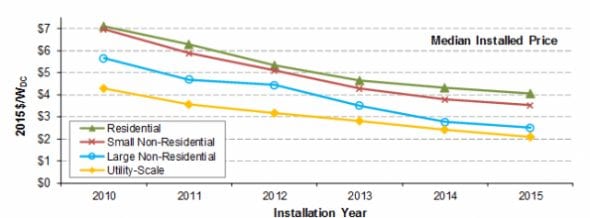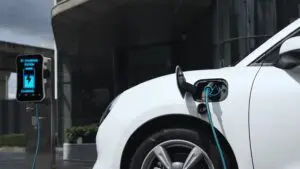Solar PV prices hit a new “all-time low” in the US in 2015, a new report has revealed, with some residential systems installed for as little as $3.30/W, and the cheapest utility-scale PV coming in below $1.60/W, while four out of five regions had PPA prices of less that $50/MWh.

The prices were revealed in the latest “state of the market reports” from the the US Department of Energy’s Lawrence Berkeley National Laboratory (Berkeley Lab).
And while for rooftop solar they’re not as low as Australia (see chart above), for the US, they mark the sixth consecutive year of “significant price reductions” for distributed PV systems.

These included a $0.20-per-watt (W) or 5 per cent year-on-year price decline for installed residential systems; $0.30/W (7%) for smaller non-residential systems, and $0.30/W (9%) for larger non-residential systems.
Prices for utility-scale PV systems that came online in 2015 were also found to have fallen – by $0.30/W (12%) from the prior year. As for PPAs, the report – and the chart below – shows these were priced at or below $50/MWh throughout the year (levelized, in real 2015 dollars), with a few priced as aggressively as ~$30/MWh.

“Falling PPA prices have enabled the utility-scale market to expand beyond the traditional strongholds of California and the Southwest into up-and-coming regions like Texas, the Southeast, and even the Midwest,” said Berkeley Lab’s Mark Bolinger.
And preliminary data for 2016 so far suggest that prices have continued to fall within most American states and market segments.
“This marked the sixth consecutive year of significant price reductions for distributed PV systems in the US,” said Galen Barbose of Berkeley Lab’s Electricity Markets and Policy Group, the lead author of one of the reports.
The report attributes the price declines to reductions in other hardware costs and to solar “soft” costs, rather than to a reduction in the costs of the panels themselves.
Both reports – Tracking the Sun, and Utility-Scale Solar 2015 – also highlight “tremendous variability” in PV system pricing.
For example, among residential systems installed in 2015, 20 per cent sold for less than $3.30/W, while another 20 percent sold for more than $5.00/W – a discrepancy that reflects a “host of factors,” including differences in system design and component selection, market and regulatory conditions, and installer characteristics.
Utility-scale projects completed in 2015 also vary widely in price, with the cheapest 20 percent priced below $1.60/W, compared to the most expensive 20 per cent priced above $2.60/W.
“Some of the observed price differences between projects can be explained by varying lag times between contract negotiation and project completion, as some of these projects have been under development, or even construction, for several years,” said Berkeley Lab’s Joachim Seel.








